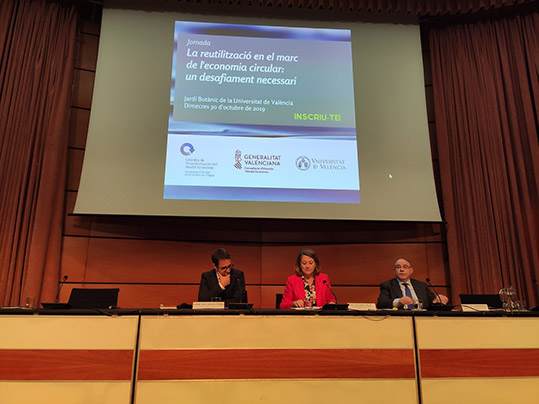The circular economy, a tool for the transformation of the Valencian economic model
- Càtedres Institucionals
- October 30th, 2019

The new Economic Model Transformation Chair: Circular Economy in the Water Sector of the Universitat de València was presented this Wednesday in the Joan Plaça Auditorium of the UV Botanical Garden. This chair has been created jointly by the Universitat with the Department of Finance and Economic Model of the Valencian Government, and has been presented in the ‘Reuse in the framework of the circular economy: a necessary challenge’.
The Vice-Principal of Innovation and Transfer of the UV, María Dolores Real, has opened the day together with the general director of Economic Model, Regional Department for Financing and Financial Policy, Juan Salvador Pérez and the professor of Applied Economics responsible for the Chair, Francesc Hernández. Real stressed the importance of the Chair in promoting dialogue between the academic community and the business and institutional sectors. She is also confident that the Chair can help with implementing new solutions: “R+D+i has to propose innovative solutions that favour the change towards circular models.”
For his part, the general director of Economic Model has spoken of the need to change the paradigm, but also the mindset: “In less than 10 years, water demand will exceed our available resources by 40%. Situation is urgent.” Faced with this situation, Juan Salvador Pérez considers it indispensable that we stop looking at wastewater as residues. On the contrary, they “are a fundamental and very valuable resource” on the way to a new productive and economic model.
For Francesc Hernández, director of the Chair, the main objective is to “contribute to the transformation of the economic model”. In his opinion, “the circular economy must be the engine of this transformation. It's not that we don't have many more options, the thing is that it's the only one we have.” He also highlighted the pragmatic and operational character of the Chair and trusted in its nature as an agent of change: “the theoretical framework is clear to us, now we must begin to work so that the main actors of our society implement the principles of the circular economy”.
Next, the General Manager of the Economic Model was in charge of opening the lectures. Juan Salvador Pérez spoke about the role of the circular economy in the transformation of the Valencian economic model and said that “the change towards a new productive model has been a priority of the Govern del Botànic since its beginnings”. Thus, he highlighted the importance of the circular economy in the Action Plan 2017-2027 given its strategic nature: “the circular economy generates value for both society and business. It is a more efficient model that helps to reduce consumption and emissions. In addition, it can also generate market niches and new jobs.”
At the same time, Roberto Arnau, Deputy Director General of Innovation Programmes of the Agència Valenciana de la Innovació (Valencian Innovation Agency), explained in detail the programmes and lines of action of the organisation and highlighted the need for innovation in the circular economy. In this sense, Arnau explained that the Agència is working on different challenges of the circular economy, such as the future of agro-food or the treatment and reuse of waste, especially water.
The director of the new Chair and Professor of Applied Economics of the UV, Francesc Hernández, has closed the first part of the day with the presentation of the ‘Guia de finançament per a projectes d’economia circular’ (Guide to financing circular economy projects). Hernández believes that institutional support is necessary so that the circular economy can generate change and jobs. It is at this point where the importance of a guide lies, which is born “with the aim of making known all the funding programmes available in terms of the circular economy, especially in the European Union”. In addition, with the preparation of this guide for both companies and administrations we also want to show that “it is perfectly achievable to consider applying for funds and very likely to get them approved”.
After the coffee break, the head of the Hydrological Planning Office of the Confederació Hidrogràfica del Xúquer (Xúquer Hydrographic Confederation) spoke about the challenges of the circular economy in the water sector. For his part, José Miguel Vanyo, Operations Manager of Hidraqua, has provided his vision on the implementation of the circular economy in water management from a business perspective, and in the same line has intervened Jaime Castillo, director of Institutional Relations of the company Global Omnium. Finally, the mayor of Ribarroja del Túria, Robert Raga, spoke of successful experiences in the implementation of the circular economy in the local government. The day was completed with a debate between lecturers and attendees.
During the conference, the potential of reuse as an engine for transforming a productive economy was addressed and its important benefits for the environment and the well-being of society were analysed. It should be remembered that the raison d'être of the Chair is the confirmation of the growing scarcity of a basic resource such as water, especially relevant in areas such as the Valencian Community. As demonstrated during the day, there is a need for a paradigm shift towards a circular economy approach in which wastewater could be seen not as residue, but as a valuable resource in the current context.
File in: Càtedres , Economia Aplicada , Universitat i societat













